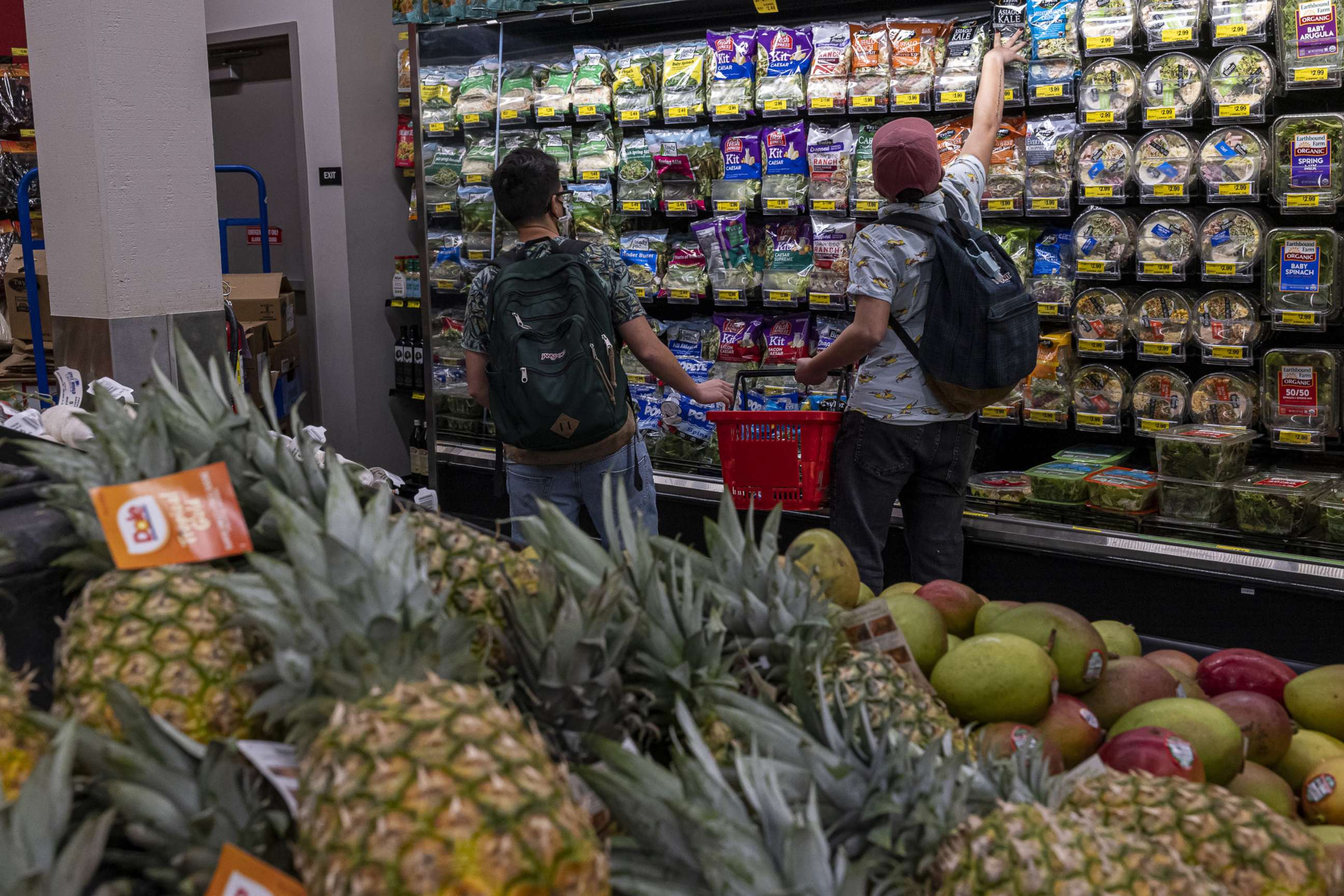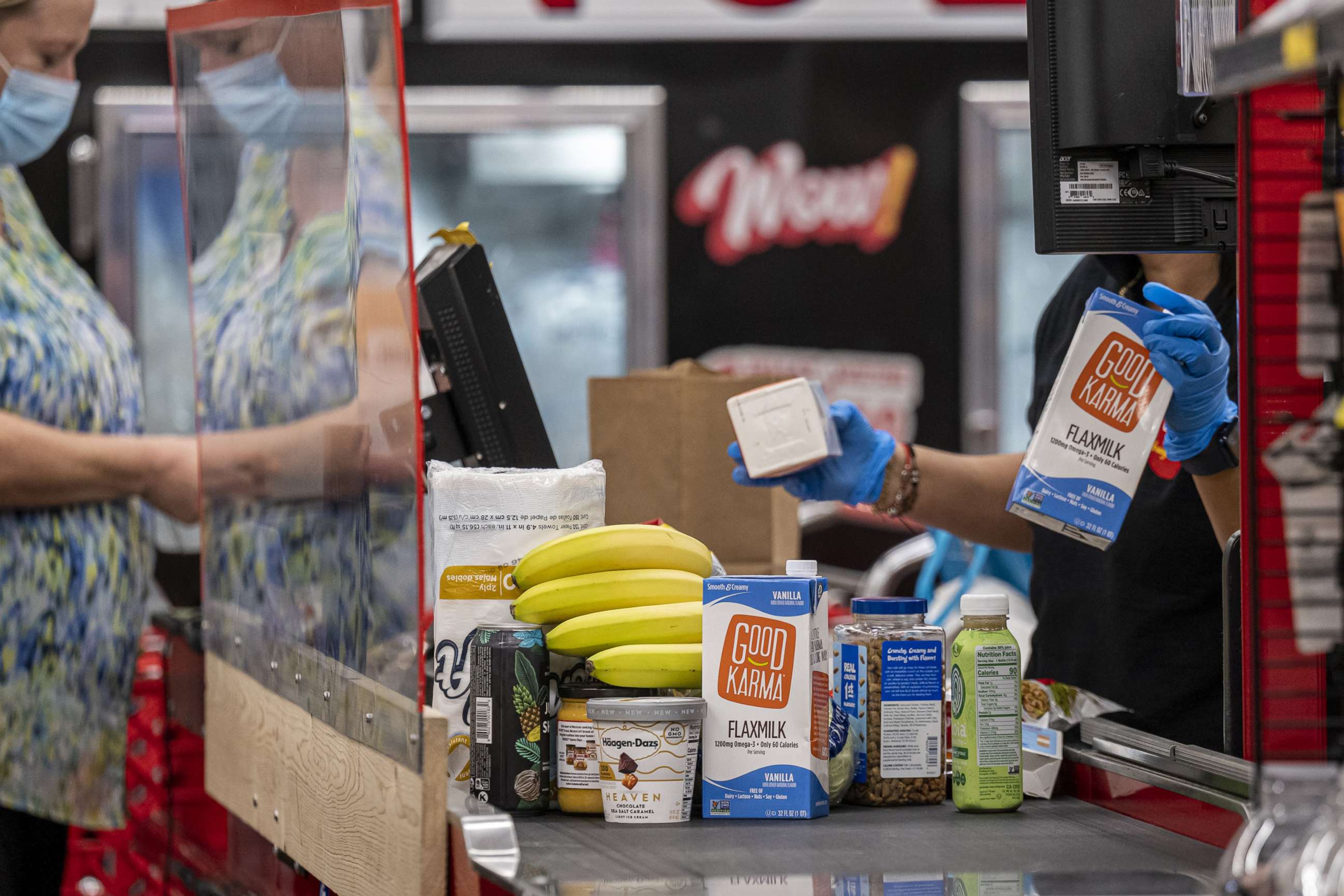Inflation, supply chain issues add to Americans' struggles this Thanksgiving
Martha Raddatz reports on the effects of inflation from Kansas City.
With inflation driving up costs and Thanksgiving right around the corner, Americans across the country are feeling the effects.
Kansas City mother of four Talitha McFadden James said she used to be able to buy all the groceries she and her family of six needed on a $100/week budget.
But during a recent trip to the grocery store, James told "This Week" co-anchor Martha Raddatz that since prices started to rise, that hasn't been the case.
James recalled the shock she felt when her grocery bill hit $500.
"I literally had to reevaluate and start taking stuff off at the scanner belt," James said. "It's embarrassing."
"But at the same time," she added, "I know what I can afford and that's not it."
Inflation is at a three-decade high. According to the U.S. Bureau of Labor Statistics, consumer prices have risen by 6.2% over the past year.
The price of fish, meat and poultry has gone up 11.9% on average over the last year, according to the U.S. Bureau of Labor Statistics. James said that at her local grocery store, a roll of ground beef that was once $18.67 is now $30.83.
According to report by the American Farm Bureau Federation, the average price of a 16-pound turkey increased 24% since last year. James said the price hike is too much for her and her family, and they won’t be eating a turkey this Thanksgiving.
Some families who haven't been able to afford food have had to rely on community pantries. Operation Breakthrough, a non-profit in Kansas City that offers childcare for families who live in poverty, is offering parents a reprieve for the holidays.
Mary Esselman, the CEO of Operation Breakthrough, said that the organization’s community pantry plans to give out about 600 turkeys to families in need.
But, according to Esselman, supply chain issues almost cut their turkey supply in half. At the last minute, one of Operation Breakthrough's food providers was able to supply the missing turkeys.
"Everyone deserves to have Thanksgiving," Esselman said.

The organization assists families that have an average income of $12,000 per year by providing early education programs, pediatric health care and even children's clothing. And with the rising inflation rate, Esselman said there's been an uptick in parents coming to the pantry for groceries.
Since many parents who use the pantry rely on it and on the meals their children are provided at school, the holidays will be especially tough.
“We go into the holidays -- most schools are out next week," Esselman said. "So you've got kids that typically would be in school having breakfast and lunch now are going to be home. And that's where we're seeing families coming in to see, how can I get ready for this holiday?"
Further up the supply chain, small farm owners have been seeing the effects of inflation as well.
Katie Nixon, who owns Greengate Family Farm in Wheatland, Missouri, said the coronavirus pandemic brought her and her family more business.
"Customers have flocked to us and we have sold most of what we can grow," Nixon said. "We're actually expanding."
However, expansions on the farm had to be postponed. Plans to buy a new high tunnel to grow more produce, which Nixon described as an "unheated greenhouse," were put on hold until winter due to supply chain issues.
Nixon said the high tunnel that was supposed to be built this past spring ended up being "a third more expensive," due to rising inflation rates. A lack of supplies because of supply chain breaks caused a waiting list for the high tunnel that, according to Nixon, was 300 names long. She wasn't able to get on to it.
The coronavirus pandemic has caused infrastructure issues, which led to supply chain issues and a rise in inflation.
Despite Nixon's farm selling their products at cost, they were forced to raise their prices for the first time in a decade. She said her farm is also in "desperate need" of a new pickup truck and a van -- and also help around the farm -- but those needs have become other projects to put on hold.
The White House has pointed to President Joe Biden’s long-awaited infrastructure bills as a way to help with inflation, though opponents of the bills say it will increase it.

Biden signed his $1.2 trillion bipartisan infrastructure bill into law last week, just as he got his $2 trillion social spending bill through the House of Representatives.
According to the White House, the Build Back Better Act lowers costs on prescription drugs, health care and housing, provides universal pre-kindergarten for every 3- and 4-year old in the country and extends the child tax credit.
"What they're talking about doing now with this next massive tax and spending spree is going to aggravate and accelerate this inflation issue even more," Sen. John Thune, R-S.D., said during a press conference held by Republican senators on Wednesday.
Biden, however, was singing a different tune during his visit to Baltimore's port in early November, pointing to a letter he received from 17 Nobel laureates on economics who asserted that his Build Back Better plan will "bring inflation down, not up."
Last week, Vice President Kamala Harris acknowledged during an interview with ABC News' George Stephanopoulos on on "Good Morning America" that inflation is "real" and "rough." But she said it is one her and Biden's "highest priorities." Harris explained the long-term solution is to "bring down the cost of living" and that the Build Back Better plan will do so with lower-cost child care, among other subsidies.




